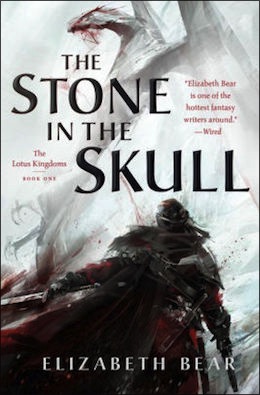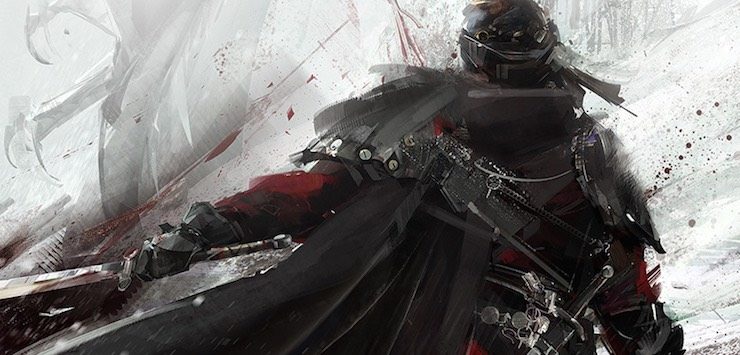I want to rave about Elizabeth Bear’s The Stone in the Skull. Actually, it feels like I need to rave about it: a glorious, dramatic, lush and striking fantasy set in the same continuity as the Eternal Sky trilogy (Range of Ghosts, Shattered Pillars, and The Steles of the Sky), with a brilliant cast of characters and an opening that involves an ice wyrm attacking a caravan on its way up a frozen river. It’s no exaggeration to say I was hooked from the first page.
I know someone else will be reviewing it around here, so I’m not going to talk about it in review-type terms. (Insofar as I could. I mean, I went head-over-heels for Range of Ghosts, and so far, The Stone in the Skull looks set to give me the same kind of wow, fantasy, GIMME feeling about it and its sequels.) Instead, let me just share some ENTHUSIASTIC RAVING about some of the cool shit it’s doing, and some of the stuff I really, really liked about it.
Bear’s fantasy is always thoughtful, both in the sense of well-thought-out and in the sense of thought-provoking. Where the Eternal Sky trilogy employed the trappings of epic fantasy—the displaced heir, the small band of companions, the enemy with terrible powers and destructive intent—The Stone in the Skull is working more with the tradition of sword and sorcery, though marrying it to an epic storyline on an epic canvas. The Gage and the Dead Man, the two characters whose journey is the axis around which the story turns, are adventurers in the mode of a tradition that includes Leiber’s Fafhrd and the Gray Mouser and Howard’s Conan the Barbarian. They’re masterless warriors, more than old enough to be cynical, who have in their respective pasts more than enough losses to make anyone bitter.
In the Gage’s case, that is a human body and a human love: the Gage has outlived his revenge and also the Wizard that made him a brass automaton strong enough to survive that revenge. In the Dead Man’s case, he was brought up to be the bodyguard of the Uthman Caliph—but the Uthman Caliphate was overthrown, and he’s been a masterless man for more of his life than he ever had a master. Not to mention that the love of his life and his children died when the caliphate fell. The two of them are wanderers without a cause who’re ready to deny that they’re looking for one. But when a cause finds them, they won’t—or perhaps they can’t—refuse.
The characters are The Stone in the Skull’s utter delight. The rajni Sayeh of Ansh-Sahal, regent for her toddler son Drupada—her only child, when she was already forty, and proof of a miraculous intervention because Sayeh is third-sex, and needed to have him cut from her body—balancing duty to her people against her desire to shield her son from harm. The rajni Mrithuri of Sarathai-tia, caught between more powerful neighbours who want her throne, balancing her strengths against her frailties and her duties, and afraid that nothing will be enough to help her thread a path between dangers. Poetesses and Wizards, handmaidens and noblewomen and caravan masters, all come to life on the page.
(And can I get a round of applause for an epic fantasy novel that shows an experienced warrior deferring to his new, younger, female lover who is also a ruler, trusting her to know what she’s doing and respecting her commitment to her duties? Also, major thumbs up for a depiction of consensual and erotic oral sex, in which said elder warrior defers to his new, younger, female lover about her desires and boundaries? I don’t think I’ve ever seen that in epic fantasy before.)
 Add that to Bear’s amazing worldbuilding, gloriously precise prose, and excellent pacing. And a wonderfully human, humane approach to relationships. The Stone in the Skull is not exactly warm and fuzzy fantasy, but it rejects grimness—and spits in the eye of pragmatism as the major criterion of human relationships. It may not take place in a kind world, but its characters move through their world with compassion. It’s hopeful without being naive. And I really love it.
Add that to Bear’s amazing worldbuilding, gloriously precise prose, and excellent pacing. And a wonderfully human, humane approach to relationships. The Stone in the Skull is not exactly warm and fuzzy fantasy, but it rejects grimness—and spits in the eye of pragmatism as the major criterion of human relationships. It may not take place in a kind world, but its characters move through their world with compassion. It’s hopeful without being naive. And I really love it.
You should all read it.
The Stone in the Skull is available October 10th from Tor Books.
Read an excerpt here.
Liz Bourke is a cranky queer person who reads books. She holds a Ph.D in Classics from Trinity College, Dublin. Her first book, Sleeping With Monsters, a collection of reviews and criticism, is out now from Aqueduct Press. Find her at her blog, where she’s been known to talk about even more books thanks to her Patreon supporters. Or find her at her Twitter. She supports the work of the Irish Refugee Council and the Abortion Rights Campaign.










